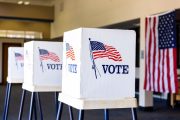Nine years ago today, 19 hijackers commandeered four civilian jetliners in American airspace and perpetrated the worst act of terrorism in American history. None of us who witnessed those terrible events will ever be able to contemplate or discuss them without the emotions natural to every human being who has ever experienced shock or tragedy. I lost no friends or relatives in the 9/11 attacks, nor has anyone of my acquaintance been killed or injured in the wars that ensued in Afghanistan or Iraq. But I feel now, as I felt on September 12, 2001, a sense of loss for an America that I had known for the first 37 years of my life, an America that quite possibly has been lost forever.
Silent leges enim inter arma (“In times of war the laws fall silent”) is the celebrated Ciceronian epigram that has betokened the end of free states for more than two millennia. America has fought a number of wars already in which our leaders have seen fit, for one reason or another, to curtail the liberties of our citizenry by changing the laws of the land, undermining the U.S. Constitution, the rights protected in the Bill of Rights, and common law protections of individual sovereignty.
The Civil War — or, if you please, the War Between the States — was ostensibly fought to free the slaves, yet it ushered in the modern age of federal supremacy, with its many encroachments on personal liberty. The Civil War was the first in which the noxious practice of a military draft was carried out; when Americans in the North resisted Lincoln’s press gangs, they were ruthlessly suppressed. So too the Civil War occasioned the first national income tax; it was retired after the war, but the grievous precedent had been set. Congressmen and journalists who refused to support President Lincoln’s program were jailed. The President even saw fit to suspend habeas corpus — an extraordinary power granted by the Constitution to Congress, not the executive branch. And the vanquished South was occupied by a military dictatorship for many years after General Lee’s surrender. All of these, and many other encroachments, were instituted in a war supposedly fought for the cause of liberty.
So too the First World War, in which the draft was revived, dissenters persecuted, and conscientious objectors imprisoned. America’s involvement in that bloody spectacle only lasted a few sanguinary months, else the consequences, politically speaking, might have been far more severe. As events turned out, America post-World War I tried to return to some semblance of her pre-war self, including her healthy distrust of overseas military interventionism.
A generation later, World War II, coming as it did on the heels of the Great Depression, enabled America’s political leaders to completely revolutionize the laws. The draft instituted in World War II became a permanent institution; all young men are still required to register for the draft, even though there has been no active conscription since the Vietnam War. The Second World War allowed what President Eisenhower famously dubbed the “military-industrial complex” to coalesce, and set the stage for a permanent globe-engirding U.S. military presence that has helped to draw America into numerous overseas entanglements of the sort the Founders warned their posterity — us — to avoid.
It is certainly not coincidental that the militarization of American society has encouraged the militarization of law enforcement at every level, from federal agencies that now routinely spy on American citizens the way opposing armies engage in espionage and surveillance to ever-more heavily armed and aggressive police forces that often behave like occupying soldiers.
The changes since 9/11 have been dismaying to those of us old enough to remember an America without police checkpoints, a Department of Homeland Security, and airports that did not regard every passenger as a potential terrorist. It’s hard now to recollect what it was like to drive up to Canada on vacation without passports or having to endure a gauntlet of suspicious border personnel, or to open a bank account without multiple proofs of residency, or to use a word like “terrorism” in a phone conversation or email without wondering momentarily how many eyes and ears might be listening or reading.
The reality of the new America hit home for me a couple of summers ago, when I stopped at a railroad crossing near my home to wait for a passing train. I got out of the car to look at some interesting flowers nearby, only to have a railroad security officer drive up in great haste a few minutes later and demand what I was doing. I had just been photographed by satellite, he told me, and the railroad was taking no chances. This was a stretch of railroad along which I had spent many happy hours playing as a boy, but now, because an important railroad tunnel lay only 10 miles away, it had become a potential target for terrorist attacks and the subject of constant surveillance.
Because of its open-ended character, the War on Terrorism spawned on that morning nine years ago has the potential over a generation or two to undo much of the legal and constitutional fabric of our republic. The same thing happened in Cicero’s time with Rome’s war on the Cilician pirates — the terrorists of their day. After the pirates’ surprise raid on the port of Ostia, Rome appointed Pompey to wage unlimited war, without any legal restraints, on the pirates. Pompey was given plenary military authority over all Roman territory within 50 miles of the ocean. He won the war, but used his ensuing popularity to forge the First Triumvirate with Caesar and Cassius, a constitutional blow from which the Roman Republic — the courage and eloquence of Cicero notwithstanding — never recovered.
We therefore ought to reflect as Americans on the potential long-term cost, both in lives and in laws, of the War on Terrorism. As we remember the fallen on 9/11 and all those who have since given their lives to combat Islamic extremists, we should determine not to allow the power of such events to utterly overwhelm our heritage and our liberties. We should decide to give voice once again to that portion of our laws that we have permitted to fall silent.
Photo: AP Images
Related article:



